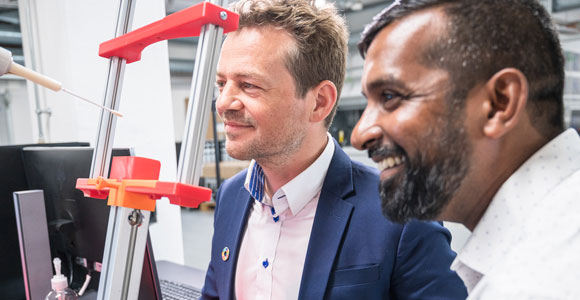
The World's First Automatic Swab Robot
A team of researchers at the University of Southern Denmark has developed the world’s first automatic swab robot in just four weeks in response to the COVID-19 crisis. A new company, owned partly by Esben Østergaard, co-founder of Universal Robots, aims to bring it to market in record time.
The World Health Organization, WHO, recommends rapid and consistent testing for COVID-19 to monitor the circulation of the virus in the general public. In response to this, the world’s first automatic swab robot was launched in Denmark on Wednesday May 27th, 2020.
The groundbreaking robot has been designed and developed by a team of robotics researchers at the Maersk Mc-Kinney Moller Institute at the University of Southern Denmark (SDU) in Odense, a city home to one of the world’s leading robotics clusters.
Reduces the risk of infection
A new company called Lifeline Robotics, which is owned jointly between the university, Norrsken Foundation, and REInvest Robotics, aims to take the swab robot from prototype to market in record time, hoping to equip the first hospitals in just a matter of months.
- Like so many others I was horrified to see the rapid development of the COVID-19 crisis, and I felt I had to do something, explains Esben Østergaard from REInvest Robotics, and co-founder of Universal Robots.
”With my background, the obvious choice was to automate the testing process. The current manual process is difficult and cumbersome. A machine will reduce the risk of infection among healthcare staff and patients, as well as give higher quality test results. This is the reason for starting Lifeline Robotics
Developed in just a month
Just like Esben Østergaard, professor Thiusius Rajeeth Savarimuthu from SDU immediately saw the potential for a swab robot, when the pandemic began to soar across Europe in early March. He gathered a team of 10 researchers, who worked day and night to create a solution with the support from the consortium of investors.
- The robot picks up the swab after the patient has scanned her ID-card, and it then identifies the right points in the patient’s throat through artificial intelligence-based computer vision. The swab test is conducted gently and securely in a fully automated process, he says.
Next step in proactive pandemic management
The swab robot has already received two million DKK in funding from Vaekstfonden, which is the Danish state’s investment fund. Its future development is also supported by Odense University Hospital:
- The robot holds great potential in mass screening for COVID-19 and other virus infections, both in health care and at border controls or airports, says Kim Brixen, medical director at Odense University Hospital.
- Staffs are in great demand in other functions, especially during the current epidemic. The robot can work around the clock, and it provides a safe procedure for every citizen tested. The closing of our societies has halted the COVID-19 epidemic in many countries. Large scale testing is part of the strategy during the re-opening of our communities. This invention is a great example of the potential of robotics within the health care sector, he says.

Minister praises the agile innovation
Ane Halsboe-Jørgensen, Danish Minister for Higher Education and Science, praises the research and agility demonstrated in the development of the robot:
- It is amazing to see how quickly this idea has jumped from idea to action in an area where new inventions are needed here and now. This is a good example of how Danish research manages to move quickly and create concrete and workable solutions amid the global corona crisis, she says.
Developed specifically for COVID-19
The agile innovation process was made possible due to the unique and well-organized cluster of automation and robotics companies in Odense, where close collaboration between education, research, and the industry is a norm.
- In Denmark we are fortunate to have world-class knowledge on robotics, safety, and medical technology. We also have a long-standing design tradition of taking the users seriously in the products we make. Leveraging on my experience from Universal Robots and the network of partners, we will develop and bring this product to market in record time, says Esben Østergaard.
- Medical professionals should not work like robots all day long, their time is better spent on patients with special needs. That is why we developed the world's first automatic swabbing robot, specifically for COVID-19, he concludes.
- Read about SDU Unmanned Aerial Systems (UAS) Center
- The Maersk Mc-Kinney Moller Institute
- Faculty of Engineering
- Department of Clinical Research
- Faculty of Health Sciences
About the company
Lifeline Robotics was founded in collaboration with The University of Southern Denmark as an urgent response to the Covid-19 pandemic. The mission of the company is to use technology for tackling current and future pandemics. Investors consist of a consortium in which the Swedish venture fund Norrsken Foundation joins 50 per cent, while REInvest Robotics and SDU share the last 50 per cent. Vækstfonden supports with DKK 2 million as a convertible loan.
About the researcher
Thiusius Rajeeth Savarimuthu develops technical solutions for the healthcare system. Already in his time as a PhD student, Thiusius Rajeeth Savarimuthu researched purposefully to automate blood sampling in order to relieve the laboratory staff. Most recently, he has developed a scanning robot in collaboration with Chief Physician and researcher in rheumatoid arthritis, Søren Andreas Just, OUH.
About the researcher
Esben Østergaard is one of the founders and inventors of Universal Robots, which is market leader within collaborative robots. During his years as a researcher and assistant professor in robotics and user interfaces at University of Southern Denmark, Esben created the foundation for a reinvention of the industrial robot. Esben is co-founder of Lifeline Robotics.